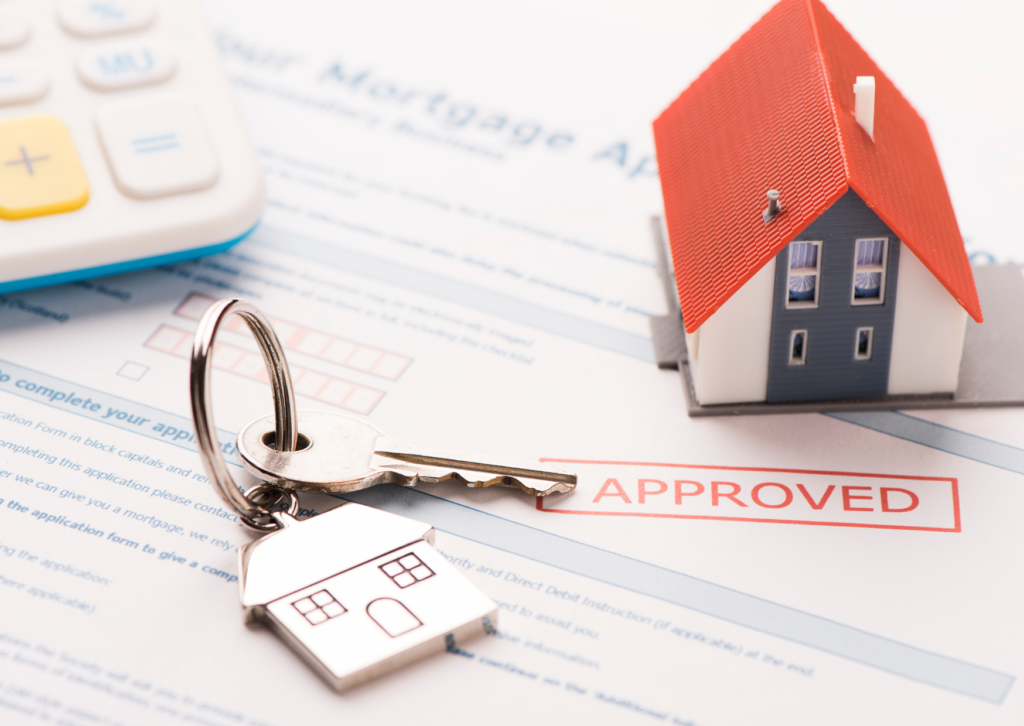The mortgage will be the biggest financial commitment most people make in their lifetime. So many decisions go into finding just the right loan, and the best way to feel well-equipped for such a process is to ask the right questions.
Not every lender will meet your needs best with the types of loans and terms available. You are free to shop around.
Here are the most important questions to ask a mortgage lender. Whether it is your first home or your third, you will find these questions go a long way in comparing lenders and finding one that suits you best.

What Types Of Mortgage Loans Do You Offer?
It might come as a surprise to some homebuyers that there are many different types of mortgages. Most homebuyers are familiar with the most common one — conventional loans — but there may be others that better suit your needs.
The lender will typically assist you in your application process through the following standard loan types:
→ Conventional Loans: There are several types of conventional loans, but because they are not insured by any government agency, qualifying is much tougher. Lenders often require credit scores of 620 and a down payment of at least 20%, which helps consumers avoid PMI, and private mortgage insurance.
→ FHA loans: These mortgages are insured by the Federal Housing Administration. Low-income buyers who can come up with as little as 3.5 percent down and have credit scores as low as 580 may qualify for an FHA loan. You will pay two kinds of FHA mortgage insurance regardless of how much you put down.
→ VA loans: Members of the military who served long enough to qualify for VA entitlement may be eligible for a VA loan. It requires no down payment and no monthly mortgage insurance. There is not a minimum credit score needed to qualify but there is a funding fee that most VA borrowers pay typically between 0.5% and 3.6%. Unless they are exempt because of a service-connected disability.
→ USDA Loans: A loan from the USDA helps very low to moderate-income families buy homes in rural areas. No down payment is required, and loan terms can be longer than 30 years. Credit scores are needed of about 640. Various factors may be substituted in lieu of credit. There are very stringent income limits.
→ Fixed-rate mortgage: An interest rate predetermined at the time when you take out your loan. You’ll pay that rate, and pay for both interest and principal throughout your entire loan period.
→ Adjustable-rate mortgage: The interest rate on an adjustable-rate mortgage changes over time. ARM loans often are offered at a lower initial rate than fixed-rate loans. But once the initial low-rate period ends, the rate adjusts periodically per the terms of your ARM. These adjustments commonly occur every six months or annually.

What Type Of Lender Are You?
Chances are you won’t need to ask this if you’re not applying for a mortgage with your local bank. Most lenders fall into three categories: Mortgage bankers, Mortgage brokers, and retail banks.
Mortgage bankers have in-house staff that processes your loan from application to funding, so they have a staff that works on your loan at every step.
They often are approved to offer down payment assistance programs, and you will make your payment to them in most cases after your loan closes.
Mortgage brokers are middlemen agents between you and a variety of lenders. Normally, they would be able to offer you access to more loan products than one mortgage banker can.
However, the individual would not be making your final payments since the loans would actually close in the name of the mortgage bank you would be sending your application to.
It’s apt to be a traditional, brick-and-mortar neighborhood bank where you might have a checking and savings account, a safety deposit box, and access to credit card and personal loan products.
Do You Charge Any Up-Front Or Non-Refundable Fees?
While it’s not unusual to pay a fee to receive a credit report if you’re obtaining a pre-approval for a mortgage, you should never be charged for preparation of a loan estimate or even for advice on a loan that will work best in your situation.
Although your loan estimate is a very good document for you to go over-it does have the repayment term, interest rate, and closing costs on it, among other things it might not signal whether you must pay any of those mentioned charges in advance.
Don’t be afraid to go over that document with your loan officer and make sure you confirm you understand which terms you have been approved for.

What Are My Estimated Closing Costs?
In addition to a down payment, closing costs represent the other major expense in home buying.
Closing costs usually range from 2% to 6% of the loan amount and cover a slew of fees that come with taking out your loan, including origination fees, application and underwriting fees, appraisals and inspections, and title fees and insurance.
Sometimes you could get lucky to negotiate with your loan provider to reduce closing costs or negotiate if the seller takes care of them.

What Will My Interest Rate And Apr Be?
That information is also included on your loan estimate. Your interest rates and annual percentage rate (APR) both represent fees you will pay for owing a debt to your lender.
These numbers are calculated from some of the same data, though APR is a far more comprehensive figure, and will more closely reflect the cost to pay back your loan. Here’s what it means:
→ Interest Rate: The percentage cost you pay to borrow money. The interest rate is calculated as a percentage of your outstanding balance each month.
→ APR: Your annual out-of-pocket cost to borrow money from your lender, your interest rate plus all of the other lender’s fees rolled into one number, including closing costs and origination fees.

Do You Offer Pre-Approval Or Prequalification?
Many loan officers and even financial experts confuse the terms preapproval and prequalification. However, there is a huge difference between the two terms:
→ Loan pre-qualification relies on unverified information you provide to a lender, your estimated income, credit score, among other qualifications.
→ Pre Approval is a more in-depth process, the lender verifies income and available down payment funds and credit history with pay stubs, W-2s, bank statements, and a full credit report.
Remember, prequalification is based on a conversation, while pre-approval is based on confirmation. A pre-approval carries more weight since the information on your application can be verified.
What Is The Lowest Possible Down Payment?
Many homebuyers are surprised by the large number of home loan programs that require low or no down payments.
Conventional programs such as Fannie Mae’s HomeReady loan require just 3% down, and FHA loans require only 3.5%. And if you qualify for VA or USDA financing, then you can avoid a down payment altogether.
Unfortunately, too many consumers still believe the myth that they require a 20% down payment in order to purchase a home and thus continue to delay their home-buying plan until they save enough for a down payment. But the more money you put down, the smaller your monthly payment will be.

Do I Have To Pay Mortgage Insurance? Are There Any Plans I Can Get Without It?
There are many different types of mortgage insurance that a lender may require you to buy. One way around, or to lower your insurance cost is by looking into alternative loan types.
You also can reduce some costs by improving your credit scores or reducing the amount of debt you carry before applying for your mortgage.
The lender might also provide you with a piggyback loan, which could help you avoid PMI if you can bring a 10% down payment to the table using a conventional mortgage.
But with an FHA loan, there is no FHA mortgage insurance avoidance policy whatsoever matter how much you paid your down payment money for.
If you’re purchasing an FHA loan, you’ll be charged less for annual mortgage insurance premiums-most of which go by the term of MIP. For your average FHA homebuyer, this would bring savings to about $800 per year.

Are There Any Down Payment Assistance Programs?
Depending on where you live and how much you make, you might be able to qualify for assistance to cover some or all of your down payment.
Many states have available first-time homebuyer programs with assistance, which includes a government grant.
Other forms of assistance include citywide homebuyer programs, assistance through your employer, or the possibility of multiple programs being combined and used together.
Ask lenders which DPA programs they work with, and whether you qualify based on your income and where you’re buying.
However, not all lenders are approved to offer DPA loans, so you might need to go looking for a list of approved lenders if you’re interested in a particular program.
What Credit And Income Qualifications Do I Need To Fulfill?
Credit scores and income go hand in hand with what you can qualify for. Lenders are not exactly the same, but this is normally what lenders will be looking to approve your mortgage application:
→ Credit score minimum: Most lenders require 620 or better. Even lower scores will qualify, but you’ll qualify for considerably more loans and better terms the higher your score is. To get the absolute best possible rates you’ll need a credit score of 780 — plus a lower DTI ratio.
→ DTI ratio: The ratio is a computation of your monthly debt payments, figured with your gross monthly income. Lenders will use this figure as a basis for evaluating your affordability, and if such a loan will push your debt obligations above 43% of your monthly gross income, they may not approve the loan. If your DTI ratio exceeds 40% on a conventional loan, then you will pay a fee added to your total loan cost.
→ Employment history: In addition to income, lenders will require your employment status and may ask for a few years of employment history that’s fairly stable.
How Long Does The Pre-Approval Last?
Well, mortgage pre-approvals actually have an expiration date. How long does a pre-approval last? Consequently, the date when mortgage pre-approvals are valid can be quite extensive but usually ranges from 60 to 90 days from your lender.
It’s good to know this because it creates a defined window where you clearly know what your purchasing power is.
In this case, your pre-approval may expire, and there might be uncertainties over the loan amount and the terms of the loan, among many other issues. Secondly, delays may sabotage your home purchase.
The expiration date will be stated in your pre-approval letter, hence giving you a timeline for when it would be time to reapply if you haven’t found your dream home yet.
Is There A Prepayment Penalty?
It’s not common, but some lenders charge a prepayment penalty for paying all or part of your loan balance within a set time from closing. You can find it on the first page of your loan estimate or, before closing, on your closing disclosure.
Paying off your mortgage early is something the best you can do to reduce the debt that you have. The interest is calculated on your outstanding balance month-on-month, so your early payments reduce your total amount of interest charges.
How Long Will It Take, From Start To Finish-From Application To Closing?
There is variation in how long it takes from lender to lender to process a loan, and government-insured loans may take a bit longer. So ask your lender about this up front.
It can take approximately 43 days to finalize the whole home purchase with a conventional loan from application to closing.
Refinances take an extra day, so you’ll want to factor in 45 days if you want to replace your current loan with a new one.
In that time, you will want to make sure you understand how the lender will communicate with you and how you will be able to get things you need from them — that way, you won’t inadvertently drag out the process.
Will You Service My Loan?
The company that lends you the mortgage may be quite different from where you end up dealing with if things go down the line. The reason for that is because some lenders sell the mortgages to other companies that “service” the loans, handling issues like billing and account management.
Ask your loan officer if your mortgage will be transferred to a loan servicer after closing-this way, you can be prepared to deal with a different agency. You will also get notices from both the lender and the servicer if your loan is later transferred.
What’s The Best Mortgage Program For Me?

Not all mortgages are created equal. There are so many different types of mortgage programs, and each comes with its positives and negatives, fitting certain types of borrowers and situations.
The lender can help you narrow down the best loan program for you by giving them information regarding your financial situation.
This becomes important because the right mortgage can save you over the life of the loan and make sure that you aren’t over-extending yourself when it comes to monthly mortgage payments.
Whether you’re looking for a fixed-rate mortgage to make paying predictable and easier or a non-QM mortgage, best suited for self-employed individuals and real estate investors, the right choice can save you thousands of dollars over the life of the loan.
The Bottom Line
Asking the right questions of a mortgage lender will not only let you know whether they are the right partner for you, but it will also be a means of finding the best mortgage program available for your unique circumstances.
These questions to ask a mortgage lender will pave the way to a much more informed decision and lay the foundation for a positive relationship with the lender.
At United 1 Mortgage, we believe that every step of the process should be clearly explained and supported through the process. You can always count on the answers provided by our committed staff through transparent communications. Apply for a home loan with us today.